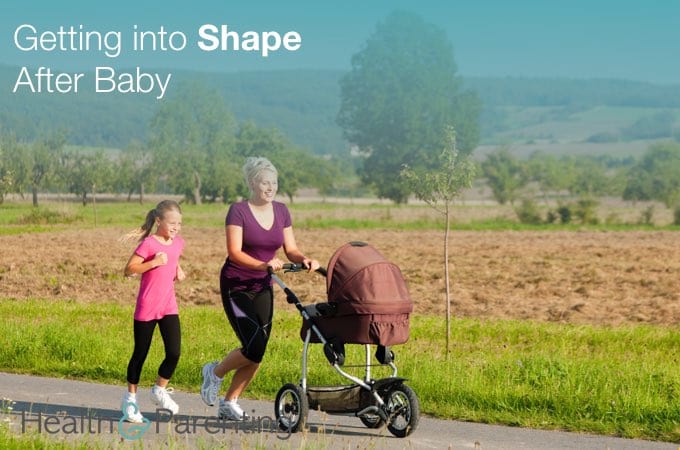After nine months of pregnancy and giving birth, it’s amazing what your body can do. But that same body may look a bit different than you remember. Although it’s normal to want to return to your pre-pregnancy shape, losing the baby weight and getting back in shape takes time.
Seeing images of fit and shapely celebrities who recently had a baby may make you feel that you should be back to your pre-baby self quickly. But don’t feel as if you have to snap back into shape immediately. Putting that type of pressure on yourself will possibly lead to frustration. After all, it took about 40 weeks to gain your baby weight, so don’t expect to lose it at lightning speed.
Keep in mind, most doctors don’t recommend dieting for the first six weeks. Your body needs the right amount of nutrients to recover from delivery and establish a good supply of breastmilk.
Once your doctor gives you the green light, a sensible approach to weight loss, which includes eating a well-balanced diet and getting regular exercise is your best bet.
Slow and Steady Wins the Race
Avoid crash diets and restricting calories too much, which can interfere with your milk supply and leave you feeling fatigued. Instead, setting reasonable goals to get back in shape can help you stay motivated. For example, most experts recommend a weight loss goal of about half a pound to a pound and half a week.
Your chances of achieving a steady and gradual weight loss are best if you stick to a healthy diet. Include plenty of fresh veggies, fruits, whole grains and low-fat dairy in your diet, as well as lean protein. Remember, breastfeeding can also help you lose weight since it can require an extra 500 calories a day.
It’s important to understand, everyone sheds pregnancy weight at a different rate. If you were already pretty fit before pregnancy, getting back into shape may be easier than if you were a couch potato. How fast you snap back also depends on how much weight you gained during pregnancy.
Postpartum Exercise
Finding the time to exercise can be a challenge for a new mom, especially if you will be working outside the home. But it’s worth the effort.
Exercise can be a great way to help you get fit, relax and improve mood. Consider joining an exercise class for new moms or incorporate your baby into your workout. Go for a walk with your baby in the stroller or pop in an exercise DVD while your little one naps. Even little bursts of physical activity a few times a day can add up.
Postpartum Fit Tips
- Always get your doctor’s approval before starting a postpartum exercise routine.
- Add a little weight training. It can speed up metabolism.
- Try to sit down and enjoy your meals. Rushing through your meals can leave you feeling unsatisfied and reaching for too many snacks.
- Drink plenty of water. Sometimes thirst is mistaken for hunger.
- Make fitness a priority. Being at your best helps you be a better mommy.
- Try to remain positive and patient. Although you may not be able to fit into your jeans as soon as you like, you have a beautiful baby who does not care what the scale says. Enjoy this time, keep working towards your fitness goals and cut yourself a little slack.
Written by Mary Ann DePietro @ writerlady34
This information is not intended to replace the advice of a trained medical doctor. Health & Parenting Ltd disclaims any liability for the decisions you make based on this information, which is provided to you on a general information basis only and not as a substitute for personalized medical advice. All contents copyright © Health & Parenting Ltd 2016. All rights reserved.











